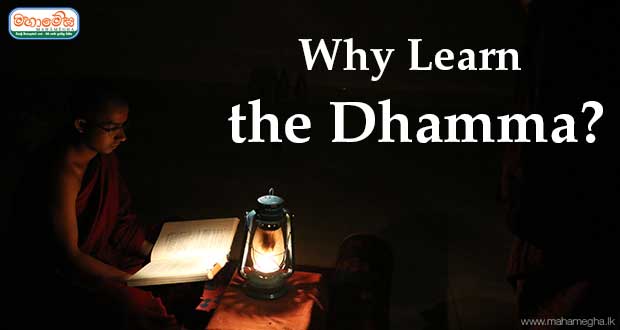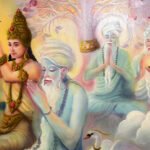Even though you might not be the wealthiest, most famous, most beautiful, or most powerful person, you are still immensely fortunate. Why? Because you have the chance to learn the Buddha’s Dhamma. Considering all of the countries in this world, the opportunity to live in a place where the teachings of the Buddha are accessible, taught, and flourishing is extremely rare.
“Licchavis, the manifestation of five gems is rare in the world. What five? (1) The manifestation of a Tathāgata, an Arahant, a Perfectly Enlightened One is rare in the world. (2) A person who teaches the Dhamma and Discipline proclaimed by a Tathāgata is rare in the world. (3) When the Dhamma and Discipline proclaimed by the Tathāgata has been taught, a person who realizes it is rare in the world. (4) When the Dhamma and Discipline proclaimed by a Tathāgata has been taught, a person who realizes it and practices in accordance with the Dhamma is rare in the world. (5) A grateful person who recollects the help they have received is rare in the world. Licchavis, the manifestation of these five gems is rare in the world.”
— AN 5.195 Piṅgiyānī Sutta
We should be able to understand upon wise reflection that even today the opportunity to associate with such rare people is not beyond our reach. That is, only if we are wise in identifying the person who stays true to the Dhamma taught by the Buddha by teaching the original discourses unaltered and without capricious interpretations. In discerning whether the Dhamma taught by another claiming to be the teachings of the Buddha are indeed the words of the Buddha, we should keep in mind the Four Great References spoken of by the Buddha in the Mahāpadesadesanā Sutta.
“Monks, I will teach you these four great references. Listen and attend closely; I will speak.” “Yes, Bhante,” those monks replied. The Blessed One said this:
“What, monks, are the four great references? (1) “Here, monks, a monk might say: ‘In the presence of the Blessed One I heard this; in his presence, I learned this: “This is the Dhamma; this is the discipline; this is the Teacher’s teaching!”‘ That monk’s statement should neither be approved nor rejected. Without approving or rejecting it, you should thoroughly learn those words and phrases and then check whether they are in line with the discourses and compare them with the discipline. If, when you check whether they are in line with the discourses and compare them with the discipline, [you find that] they are not in line with the discourses and are contradictory to the discipline, you should draw the conclusion: ‘Surely, this is not the word of the Blessed One, the Arahant, the Perfectly Enlightened One. It has been incorrectly understood by this monk.’ Thus you should discard it.
“But a monk might say: ‘In the presence of the Blessed One I heard this; in his presence, I learned this: “This is the Dhamma; this is the discipline; this is the Teacher’s teaching!”‘ That monk’s statement should neither be approved nor rejected. Without approving or rejecting it, you should thoroughly learn those words and phrases and then check whether they are in line with the discourses and compare them with the discipline. If, when you check whether they are in line with the discourses and compare them with the discipline, [you find that] they are in line with the discourses and agree with the discipline, you should draw the conclusion: ‘Surely, this is the word of the Blessed One, the Arahant, the Perfectly Enlightened One. It has been correctly understood by this monk.’ You should remember this first great reference.
(2) “Then a monk might say: ‘In such and such a residence a Saṅgha is dwelling with elders and prominent monks. In the presence of that Saṅgha I heard this; in its presence, I learned this: “This is the Dhamma; this is the discipline; this is the Teacher’s teaching.”‘ That monk’s statement should neither be approved nor rejected. Without approving or rejecting it, you should thoroughly learn those words and phrases and then check whether they are in line with the discourses and compare them with the discipline. If, when you check whether they are in line with the discourses and compare them with the discipline, [you find that] they are not in line with the discourses and are contradictory to the discipline, you should draw the conclusion: ‘Surely, this is not the word of the Blessed One, the Arahant, the Perfectly Enlightened One. It has been incorrectly understood by that Saṅgha.’ Thus you should discard it.
“But . . . if, when you check whether they are in line with the discourses and compare them with the discipline, [you find that] they are in line with the discourses and agree with the discipline, you should draw the conclusion: ‘Surely, this is the word of the Blessed One, the Arahant, the Perfectly Enlightened One. It has been correctly understood by that Saṅgha.’ You should remember this second great reference.
(3) “Then a monk might say: ‘In such and such a residence several elder monks are dwelling who are learned, heirs to the heritage, experts on the Dhamma, experts on the discipline, experts on the outlines. In the presence of those elders I heard this; in their presence, I learned this: “This is the Dhamma; this is the discipline; this is the Teacher’s teaching!”‘ That monk’s statement should neither be approved nor rejected. Without approving or rejecting it, you should thoroughly learn those words and phrases and then check whether they are in line with the discourses and compare them with the discipline. If, when you check whether they are in line with the discourses and compare them with the discipline, [you find that] they are not in line with the discourses and are contradictory to the discipline, you should draw the conclusion: ‘Surely, this is not the word of the Blessed One, the Arahant, the Perfectly Enlightened One. It has been incorrectly understood by those elders.’ Thus you should discard it.
“But . . . if, when you check whether they are in line with the discourses and compare them with the discipline, [you find that] they are in line with the discourses and agree with the discipline, you should draw the conclusion: ‘Surely, this is the word of the Blessed One, the Arahant, the Perfectly Enlightened One. It has been correctly understood by those elders.’ You should remember this third great reference.
(4) “Then a monk might say: ‘In such and such a residence one elder monk is dwelling who is learned, an heir to the heritage, an expert on the Dhamma, an expert on the discipline, an expert on the outlines. In the presence of that elder I heard this; in his presence, I learned this: “This is the Dhamma; this is the discipline; this is the Teacher’s teaching!”‘ That monk’s statement should neither be approved nor rejected. Without approving or rejecting it, you should thoroughly learn those words and phrases and then check whether they are in line with the discourses and compare them with the discipline. If, when you check whether they are in line with the discourses and compare them with the discipline, [you find that] they are not in line with the discourses and are contradictory to the discipline, you should draw the conclusion: ‘Surely, this is not the word of the Blessed One, the Arahant, the Perfectly Enlightened One. It has been incorrectly understood by that elder.’ Thus you should discard it.
“But a monk might say: ‘In such and such a residence one elder monk is dwelling who is learned, an heir to the heritage, an expert on the Dhamma, an expert on the discipline, an expert on the outlines. In the presence of that elder I heard this; in his presence, I learned this: “This is the Dhamma; this is the discipline; this is the Teacher’s teaching!”‘ That monk’s statement should neither be approved nor rejected. Without approving or rejecting it, you should thoroughly learn those words and phrases and then check whether they are in line with the discourses and compare them with the discipline. If, when you check whether they are in line with the discourses and compare them with the discipline, [you find that] they are in line with the discourses and agree with the discipline, you should draw the conclusion: ‘Surely, this is the word of the Blessed One, the Arahant, the Perfectly Enlightened One. It has been correctly understood by that elder.’ You should remember this fourth great reference.
“These, monks, are the four great references.”
AN 4.180 – The Great References (Mahāpadesadesanā Sutta)
The Buddha’s Dhamma is the treasure of wisdom in this world. In the modern world, we gain knowledge through various means: television, internet, smartphones, radio, and print-media all constantly vie for our attention. They deliver to us their message while we usually passively accept whatever is purveyed. In this way we can acquire any form of knowledge, quite easily, but does this knowledge bring real benefit to our lives? If we investigate wisely, more often than not, the knowledge, we gain from these forms of media on a daily basis provoke the unwholesome tendencies in our minds.
Gaining knowledge of the Buddha’s teachings, however, is quite a different matter. By learning the Buddha’s teachings, we develop wholesome qualities in our minds. When we learn the discourses taught by the Buddha, the suttas, we learn about the profound teachings of the Four Noble Truths, Dependent Origination (paṭiccasamuppāda), and the 37 requisites of enlightenment (bodhipakkhiyā dhammā). As mentioned in the Mahāpadesadesanā Sutta, the discourses are our yardstick in discerning the pure teachings of the Buddha. However, one could ask the question: “What are the main teachings found in the Buddha’s discourses?” The answer is simply the three teachings just described: the Four Noble Truths, Dependent Origination ( paṭiccasamuppāda), and the 37 requisites of enlightenment (bodhipakkhiyā dhammā); when we learn the Dhamma–from books or by other means–we should compare what we learn to these. The Buddha once described his aim in teaching the Dhamma thus:
“There are, Nigrodha, unwholesome things that have not been abandoned, tainted, conducive to rebirth, fearful, productive of painful results in the future, associated with birth, decay, and death. It is for the abandonment of these that I teach the Dhamma. If you practice accordingly, these tainted things will be abandoned, and the things that make for purification will develop and grow, and you will attain to and dwell, in this very life, in the fullness of perfected wisdom.”
— DN 25 Udumbarikā Sutta
It should, therefore, be understood that we face great danger journeying on in saṃsāra fettered with defilements of the mind. It is for purification of mind and freedom from the round of rebirths that the Buddha teaches the Dhamma. And how is a disciple learned in the Dhamma?
“Monks, live under a protector, not without a protector. One without a protector lives in suffering. There are these ten qualities that serve as a protector. What ten?
…A monk has learned much, remembers what he has learned, and accumulates what he has learned. Those teachings that are good in the beginning, good in the middle, and good in the end, with the right meaning and phrasing, which proclaim the perfectly complete and pure spiritual life—such teachings as these he has learned much of, retained in mind, recited verbally, investigated mentally, and penetrated well by wisdom…This is a quality that serves as a protector.”
— AN 10.17 Protector (Paṭhamanāthakaraṇa Sutta)
We can understand, according to this sutta, that learning the Dhamma well, mastering the Dhamma, protects our lives. To go for refuge to the Buddha out of faith in His Enlightenment is to also go for refuge to the teachings proclaimed by Him—the Dhamma. To go for refuge to the Dhamma is also to go for refuge to the followers who are living examples of the Dhamma, who practice in accordance with the Dhamma and have realized the Dhamma—the Noble Saṅgha. In this way, to go for refuge to the Buddha is to learn his teachings in letter and practice, and to associate with the community which embodies them, namely the community of Venerable monks and nuns. In such a way we take the three refuges as pious disciples of the Buddha. However, just what are the benefits of learning the Dhamma?
“Monks, there are these five benefits in listening to the Dhamma. What five? One hears what one has not heard; one clarifies what has been heard, one emerges from perplexity; one straightens out one’s view; one’s mind becomes placid. These are the five benefits of listening to the Dhamma.”
— AN 5.202 Listening to the Dhamma (Dhammasavaṇa Sutta)
In two suttas the Buddha explains unambiguously how knowledge of the Dhamma is a cause and condition for attaining fruits of the path. In AN 5.26 (Vimuttāyatana Sutta), the Buddha explains five bases for attaining liberation in this life: (1) while learning the Dhamma, (2) while teaching the Dhamma, (3) while reciting the Dhamma, (4) while reflecting on the Dhamma, and through (5) meditation. When all of these five bases are directly concerned with knowledge of the Dhamma (even to practice meditation properly one must learn the Dhamma well), could anyone rightly say that learning the Dhamma is not important? Knowledge of the Buddha’s teachings is the very basis for achieving consummation in the teachings.
Even if one is unable to attain fruits of the path in this life, learning the Dhamma well here and now facilitates the realization of the Dhamma in the next life. The Buddha explains in AN 4.191 (Sotānudhata Sutta) how a disciple who has learned the Dhamma while in the human world will benefit when they are reborn in the heavenly world. They have a chance to realize the Dhamma there itself.
We are fortunate today to have translations of the Buddha’s original discourses readily available, in clear English and Sinhala. We should be heedful in taking advantage of this precious, invaluable opportunity to learn the Dhamma of the Perfectly Enlightened One—the Dhamma which dispels all the darkness of ignorance and illuminates our lives with wisdom’s radiant splendor.
– By Mukti Upasaka











Recent Comments